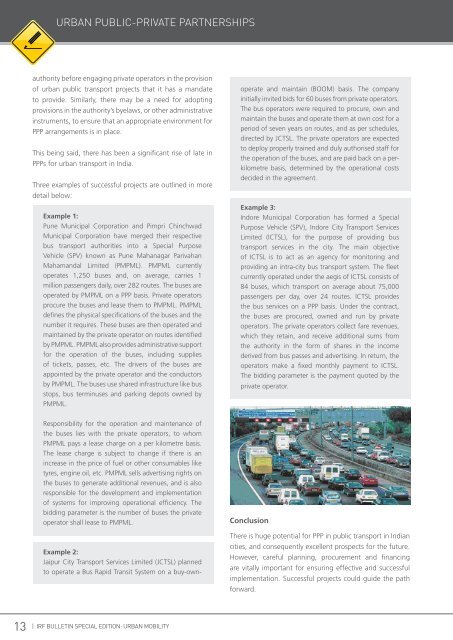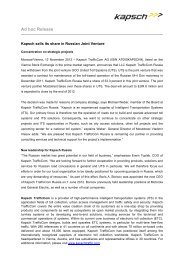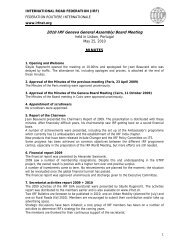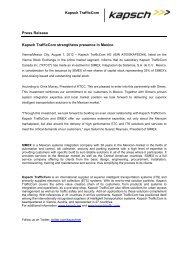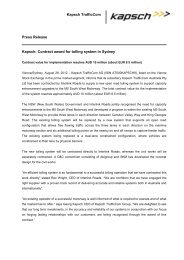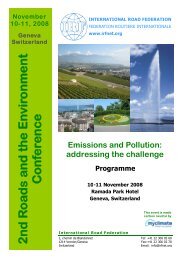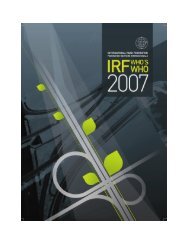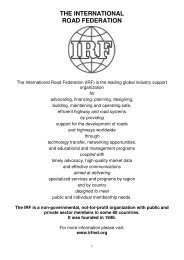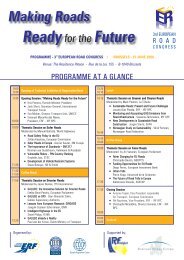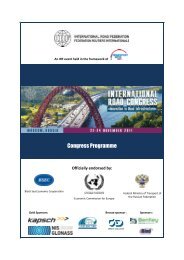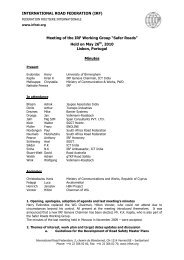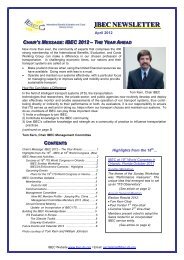Motorways and Urban Mobility - International Road Federation
Motorways and Urban Mobility - International Road Federation
Motorways and Urban Mobility - International Road Federation
Create successful ePaper yourself
Turn your PDF publications into a flip-book with our unique Google optimized e-Paper software.
13<br />
URBAN PUBLIC-PRIVATE PARTNERSHIPS<br />
authority before engaging private operators in the provision<br />
of urban public transport projects that it has a m<strong>and</strong>ate<br />
to provide. Similarly, there may be a need for adopting<br />
provisions in the authority’s byelaws, or other administrative<br />
instruments, to ensure that an appropriate environment for<br />
PPP arrangements is in place.<br />
This being said, there has been a significant rise of late in<br />
PPPs for urban transport in India.<br />
Three examples of successful projects are outlined in more<br />
detail below:<br />
Example 1:<br />
Pune Municipal Corporation <strong>and</strong> Pimpri Chinchwad<br />
Municipal Corporation have merged their respective<br />
bus transport authorities into a Special Purpose<br />
Vehicle (SPV) known as Pune Mahanagar Parivahan<br />
Maham<strong>and</strong>al Limited (PMPML). PMPML currently<br />
operates 1,250 buses <strong>and</strong>, on average, carries 1<br />
million passengers daily, over 282 routes. The buses are<br />
operated by PMPML on a PPP basis. Private operators<br />
procure the buses <strong>and</strong> lease them to PMPML. PMPML<br />
defines the physical specifications of the buses <strong>and</strong> the<br />
number it requires. These buses are then operated <strong>and</strong><br />
maintained by the private operator on routes identified<br />
by PMPML. PMPML also provides administrative support<br />
for the operation of the buses, including supplies<br />
of tickets, passes, etc. The drivers of the buses are<br />
appointed by the private operator <strong>and</strong> the conductors<br />
by PMPML. The buses use shared infrastructure like bus<br />
stops, bus terminuses <strong>and</strong> parking depots owned by<br />
PMPML.<br />
Responsibility for the operation <strong>and</strong> maintenance of<br />
the buses lies with the private operators, to whom<br />
PMPML pays a lease charge on a per kilometre basis.<br />
The lease charge is subject to change if there is an<br />
increase in the price of fuel or other consumables like<br />
tyres, engine oil, etc. PMPML sells advertising rights on<br />
the buses to generate additional revenues, <strong>and</strong> is also<br />
responsible for the development <strong>and</strong> implementation<br />
of systems for improving operational efficiency. The<br />
bidding parameter is the number of buses the private<br />
operator shall lease to PMPML.<br />
Example 2:<br />
Jaipur City Transport Services Limited (JCTSL) planned<br />
to operate a Bus Rapid Transit System on a buy-own-<br />
| IRF BULLETIN SPECIAL EDITION: URBAN MOBILITY<br />
operate <strong>and</strong> maintain (BOOM) basis. The company<br />
initially invited bids for 60 buses from private operators.<br />
The bus operators were required to procure, own <strong>and</strong><br />
maintain the buses <strong>and</strong> operate them at own cost for a<br />
period of seven years on routes, <strong>and</strong> as per schedules,<br />
directed by JCTSL. The private operators are expected<br />
to deploy properly trained <strong>and</strong> duly authorised staff for<br />
the operation of the buses, <strong>and</strong> are paid back on a perkilometre<br />
basis, determined by the operational costs<br />
decided in the agreement.<br />
Example 3:<br />
Indore Municipal Corporation has formed a Special<br />
Purpose Vehicle (SPV), Indore City Transport Services<br />
Limited (ICTSL), for the purpose of providing bus<br />
transport services in the city. The main objective<br />
of ICTSL is to act as an agency for monitoring <strong>and</strong><br />
providing an intra-city bus transport system. The fleet<br />
currently operated under the aegis of ICTSL consists of<br />
84 buses, which transport on average about 75,000<br />
passengers per day, over 24 routes. ICTSL provides<br />
the bus services on a PPP basis. Under the contract,<br />
the buses are procured, owned <strong>and</strong> run by private<br />
operators. The private operators collect fare revenues,<br />
which they retain, <strong>and</strong> receive additional sums from<br />
the authority in the form of shares in the income<br />
derived from bus passes <strong>and</strong> advertising. In return, the<br />
operators make a fixed monthly payment to ICTSL.<br />
The bidding parameter is the payment quoted by the<br />
private operator.<br />
Conclusion<br />
There is huge potential for PPP in public transport in Indian<br />
cities, <strong>and</strong> consequently excellent prospects for the future.<br />
However, careful planning, procurement <strong>and</strong> financing<br />
are vitally important for ensuring effective <strong>and</strong> successful<br />
implementation. Successful projects could guide the path<br />
forward.


